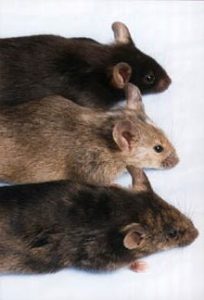Transgenic and Chimeric Mouse Facility
 The Transgenic and Chimeric Mouse Facility provides a centralized service to efficiently produce infection-free transgenic, chimeric, and genome-edited strains of mice. These mice carry randomly inserted transgenes and/or site-specific alterations in the mouse genome of specific interest to Penn researchers. The Facility offers services including DNA pronuclear injection into fertilized oocytes (along with genotyping of transgenic founders), ES cell injection into blastocysts, cytoplasmic/pronuclear injections into fertilized oocytes of CRISPR-Cas9 mix (gRNA, Cas9RNA, ssDNA/dsDNA templates), embryo and sperm cryopreservation, in vitro fertilization, and re-derivation of live and cryopreserved lines. The Core also oversees a cyropreservation facility for long-term storage of mouse embryos and sperm samples.
The Transgenic and Chimeric Mouse Facility provides a centralized service to efficiently produce infection-free transgenic, chimeric, and genome-edited strains of mice. These mice carry randomly inserted transgenes and/or site-specific alterations in the mouse genome of specific interest to Penn researchers. The Facility offers services including DNA pronuclear injection into fertilized oocytes (along with genotyping of transgenic founders), ES cell injection into blastocysts, cytoplasmic/pronuclear injections into fertilized oocytes of CRISPR-Cas9 mix (gRNA, Cas9RNA, ssDNA/dsDNA templates), embryo and sperm cryopreservation, in vitro fertilization, and re-derivation of live and cryopreserved lines. The Core also oversees a cyropreservation facility for long-term storage of mouse embryos and sperm samples.
Photograph by Todd Bauders
Memo 3/18/15 regarding PSOM Subvention Requests for Mouse Cryopreservation Services
Other Links
- Diabetes Research Center
- Digestive & Liver Disease Center
- Cancer Center Shared Resources
- CRISPR Core

About the Mice Image
The mice featured are three littermates generated by the injection of ES cells into mouse blastocysts. In laymen’s terms, they are siblings born to the same surrogate mother, exhibiting different combinations of the same genetic mixture. While the coats of the middle and bottom mice reveal the contribution of both the ES cells (agouti) and their host embryos (black), the top shows no external evidence of any contribution from its ES cells.
These particular mice were created by our facility for research conducted in the lab of Dr. John R. Stanley, previously Chairman of the Department of Dermatology in the University of Pennsylvania School of Medicine. A targeted mutation disrupted the Desmoglein 3 gene, resulting in a phenotype similar to Pemphigus Vulgaris. (J.Cell Biol. 137: 1091-1102, 1997).
